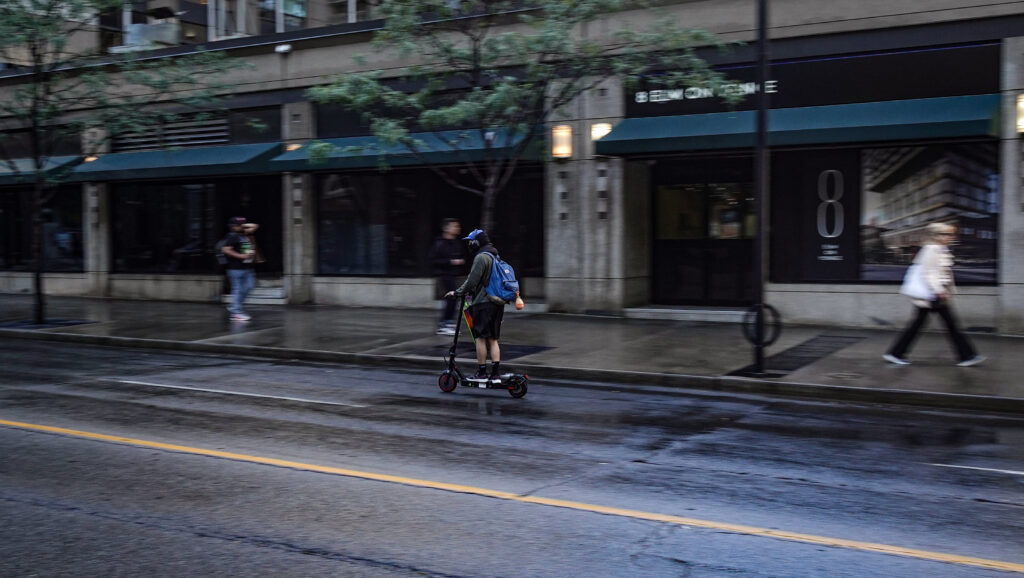
An e-scooter rider cruises down Bloor Street. (OTR/Mehmet Oner)
Listen to the full story here:
A recent Nanos survey reveals that more than half of Canadians support requiring electric scooters (e-scooters) and e-bike users to obtain a permit or license. E-scooters have gained popularity in recent years as a sustainable urban mobility option, thanks to their affordability, innovative design and eco-friendly features.
According to a 2023 Statista report, the e-scooter sharing market in Canada grew by four per cent, estimated at the time to reach US$36.30 million in 2024. The market is projected to grow by 25 per cent by 2029, yet concerns about safety and legality persist.
Under current Toronto city bylaws, the use of e-scooters on public streets in Toronto has been banned since 2019, but Brampton launched an e-scooter pilot program in 2023 and Pickering made e-scooters legal on city streets in 2022. According to the Ontario Highway Traffic Act, an e-scooter “provides a maximum speed of 24 kilometres per hour.” Still, some e-scooters being sold can go faster, like one being sold in Mississauga that can go 60 kilometres per hour which adds further confusion to what is allowed.
Toronto resident Dana Patcas launched a petition titled “Regulate Electric Scooter Use on Toronto’s Public Streets and Sidewalks” on Change.org on Sept. 30 and it has 3,145 signatures as of now.
“In my role as a pedestrian and pet owner, I am deeply concerned about the unpredictability of these vehicles, especially when operated irresponsibly by minors,” Patcas wrote on her campaign page.
“These hazardous machines not only endanger their operators but also jeopardise the safety of pedestrians, including those walking their pets and other road users.”
Patcas’ next goal is to gather 5,000 signatures, with the Toronto City Council appearing as the decision-maker according to her campaign page.
In May 2021, Toronto city council declined to participate in the Ontario Electric Kick-Scooter Pilot Project, which allows municipalities to regulate the use of e-scooters, citing safety, liability and potential impacts on elderly residents and people with disabilities.
Most recently, on May 23, 2024, the city council voted against legalising e-scooters again.
Despite the ban, many users like Huzaifa Mahmood continue to ride e-scooters daily in Toronto.
“I don’t see any reason as to why they have to ban it,” Mahmood said.
“I believe that these scooters are very fair and they’re convenient to use and I don’t think they break any guidelines that the city has.”
Injury lawyer Hisham Imtiaz works with The Biking Lawyer and says the City’s regulations can be confusing for the average e-scooter rider, especially because there are places in Toronto where you can buy or rent an e-scooter.
“It’s like jaywalking,” Imtiaz said. “A lot of people jaywalk in the city, but how often do they get tickets? It’s not the most common thing that you’ll get a ticket for, and you can get it. It’s just that people ride around it and sometimes the city or police pick their priorities here, and that’s why you see e-scooters out on the road in Toronto even though you may not be permitted to do so according to the bylaws in place.”
The Hospital for Sick Children (SickKids) has reported a notable rise in children and youth coming to the emergency department due to injuries caused by e-scooters. During June and July 2024, the hospital treated 16 cases of e-scooter-related injuries, a significant increase from the five cases recorded in the same period in 2023.
Spokesperson for the City of Toronto Laura McQuillan said that while e-scooters can create positive changes for traffic congestion, the risks associated with the dangers of e-scooters outweigh the positives.
“Key considerations in this micro-mobility strategy include safety and the interaction of different vehicles and infrastructure, as well as education and enforcement (for instance, addressing illegal sidewalk riding and illegal blocking of lanes and cycle tracks)” McQuillan said.
Transportation expert Clarence Woudsma at the University of Waterloo says requiring a permit or license could help with safety concerns.
“In some cases, there are states where they require a user to have a licence. [Similar] to how you would register a vehicle and obtain a licence, you could introduce that kind of a regulation which would allow you an opportunity to provide training to certify a certain level of skill and operator knowledge,” he says.
Woudsma says requiring a licence or permit would also mean e-scooter riders would have to be of legal age to ride, have a “combination of highway traffic knowledge, a safe operation knowledge, the hand signals like how [to indicate turning]…There’s some very basic elements of operating that I think they could administer through some kind of testing regime.”
On the other hand, this adds another responsibility that the city and police must enforce and invest in which they might not be willing to do, according to Woudsma.
Ontario’s e-scooter pilot program ends on Nov. 27. After that date, the municipalities who participated in the program will re-evaluate how they choose to regulate e-scooters going forward.
For Toronto e-scooter users, the debate over whether they will continue to operate their e-scooters under a ban or whether the ban will remain in place in the upcoming period is ongoing.
This article may have been created with the use of AI tools such as Google Docs, Grammarly, and/or Otter.ai for transcription.


